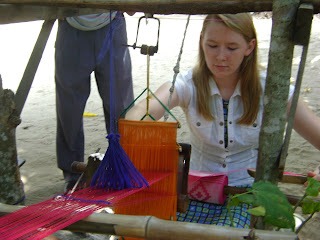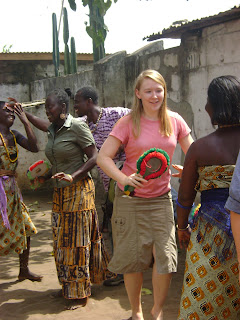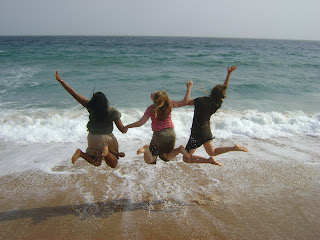Hello friends,
It's been a while. Are you healthy, and happy? How is life treating you? Has it been well? Let me tell you now, before you read any further: I am thankful for you!
I have just returned from vacation, and being away reminded me of just how incredibly thankful I am for so many things--your support among them! But let's begin back when it was still November, on Thanksgiving Day to be exact...
As you might imagine, I had quite the atypical Thanksgiving. It began early as usual, with a refreshing bucket bath to start off the morning. I had planned to meet Kathleen and Aria (my Ghana sisters and fellow Princeton Tigers class of '14) for a trip to Makola market, a sprawling region of Accra where you can buy just about anything that the average person in Ghana would need, that morning, and so I hustled to catch a tro-tro to meet them. At Makola we hoped to explore and do a bit of preliminary Christmas shopping before meeting up with our Ghana brothers, Cole and Nick, to see a movie at the mall and then venture out for our version of Thanksgiving dinner. Though assailed by unidentifiable scents and occasionally distracted by a stray chick underfoot, the three of us ventured through the cramped isles between stalls. Having dressed for the celebratory occasion in African garb, women in the market called out to us: "Akosua, wo ho yε fε paa!" / "[Generic name for any white lady, but specifically an Akan/Ashanti woman born on a Sunday], you look very beautiful!" Some stopped us and asked our names, others tried very forcefully to sell us shea butter, and others just laughed appreciatively when we told them, in Twi, that we were from America but had been in Ghana for three months. Makola was hectic, it has sweaty, it was friendly, and it was overwhelming.
We wandered about, greeted and haggled in Twi, avoided being hit by renegade taxis, and eventually emerged to purchase a massive mango with a pineapple to accompany it as a noontime snack. While it was obvious that we were still quite conspicuous and, in the eyes of many of the people we passed, a little of an oddity in a typical Ghanaian market, I was not greatly bothered by this. I realize that going to the market was exciting for me in a way that it probably never will be for the thousands of people who go there daily, who don't have the alternatives to this teeming human hub that I do, who can't just wait another six months to go back to the US or have something mailed from there to here if they can't find it at the market, who might not even have the option of going to a chain store like ShopRite at the Accra Mall when they want a little less chaos. And yet, though I and most of the Ghanaians at Makola don't share the same experience when we go there, the sights we see are the same, and so are the smells, the sounds. Like most things I do in Ghana, I will never do them quite the same as Ghanaians do or experience them in quite the same way, but the mere fact that I am experiencing them and grappling with them is significant and important, and I am thankful for the opportunity to do so.
After leaving the market, succulent mango and sweet pineapple in hand, we caught a tro-tro to the Accra mall, a location which embodied the difference between my Ghana life and that of many of the Ghanaians I met in the market. Of course, plenty of Ghanaians frequent the mall, and some shop for groceries almost exclusively at ShopRite--after all, the Accra mall is a fairly ritzy place, especially in comparison with Makola market, but it is not only for foreigners. However, the distinction between the market where average Ghanaian shops and the mall where we now found ourselves was striking. Humbled, I was thankful for the incredible and undeserved privileges I have been granted and reminded not to take them for granted.
Aria, Kathleen, and I met up with Cole and Nick at the mall, and after obtaining the movie schedule, selecting a movie, finding out it was not actually playing as per the schedule, settling for our second choice, and spending a few hours in the theater absorbing the film, the five of us gathered our belongings and headed first by tro-tro and then by a very cramped taxi to Osu for Thanksgiving Dinner.
[a tro-tro ride...]

We strolled down Oxford Street, the focus of activity in Osu, until we reached Haveli's Indian restaurant, which had been recommended to us by Kathleen's friend from work. Not quite sure what to expect as a couple of Americans entering an Indian restaurant in a part of Ghana known for being frequented by oborunis (foreigners), we nevertheless filed in. No one else was in the restaurant, which was warm and authentically furnished with the lights slightly dimmed, and as we were shown to our seats at a table appropriate for a banquet but slightly imposing for a group of five, our waiter obligingly switched on the air conditioning for us. After perusing the menu we ordered, chatted, and awaited what proved to be a delicious--if eclectic--Thanksgiving dinner. Each of us shared a few things we were thankful for, and though our gratitude was spread widely, all of us seemed to be thankful for, in addition to the unique things, similar things: our families and those supporting us during this year, and the incredible privilege that each of us has to be in Ghana.
[Nick, Kathleen, and I at Thanksgiving dinner...]

Following dinner we met Yaw and Clara, our incredible program directors, for ice cream before taking the long tro-tro ride back home. As soon as I arrived at my house to find everyone asleep, I called my family back in the U.S., and was fortunate to get to talk with my parents, my brothers, and almost my entire Dad's side of the family: the perfect end to a day of thanksgiving!
The next morning the five of us, along with Yaw and Clara, set out for a five-day vacation to the Volta Region, the easternmost part of Ghana, which borders Togo. I won't offer you a travelogue on a day-by-day basis, but I can assure you that it was everything a vacation should be: fun, exciting, relaxing, and wonderful! Being able to be instantly understood when speaking English at my typically rapid rate and with the usual idioms was a simple change from my daily life in Accra, but even that capability was a welcome freedom. We simply had a fantastic time. Let me share a couple of pictures with you:
[learning to weave kente...]

We learned how the Ewes, the primary group of people who live in the Volta Region, weave kente cloth by observing some very skilled weavers and then trying our suddenly clumsy hands at it. The cloth is woven into strips a few inches across and then created by sewing about twenty strips of cloth together to make a large piece of fabric. The Ashantis of central Ghana (who speak Twi and are the primary residents of Kumasi, the capital of the Ashanti Region, where I will be moving in about a month) also weave kente, but Ewe kente differs in its patterns.
[dressed for the shrine: Kathleen, Cole, Nick, Clara, me, Aria, and Kwakukye, our gracious Ewe-speaking guide for the weekend...]

Though a shrine is not somewhere I would go on my own, visiting briefly was an interesting cultural experience. We met the chief priest and the chief priestess as well as a group of drummers and musicians who performed traditional music and dances before we were given the chance to ask a few questions. The particular shrine we visited claims to worship one supreme being through the vessel of a lesser deity called Tobia Awia (which may not be spelled correctly?) who communicates directly with the chief priest. We were not allowed to wear our usual clothes or shoes to the shrine as doing so is a taboo.
[dancing agbodje, a traditional Ewe dance...]

Some weeks ago we took a lesson in this traditional style of dance, characterized by vigorous shoulder movements slightly akin to flapping like a bird, and the lesson has come in handy on many occasions when we have been called upon to perform! The dance is a war dance, depicting a battle, but it is performed at almost any community events, from weddings to funerals to festivals and anything in between. Our skills are certainly improving!
[the beach...]

On the last day of our vacation we spent a little time at the beach, which was positively amazing. I think no further explanation is needed :)
And so, friends, I have much to be thankful for every day. As I begin my last month in Accra, I am overwhelmed to think that already my time in Ghana is 1/3 over, but when I look back at the last three months, I am stunned by gratitude. Surely, God is good!
Love to all, and my thanks as always for reading and caring!
Jessica








